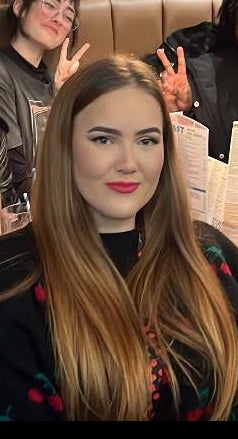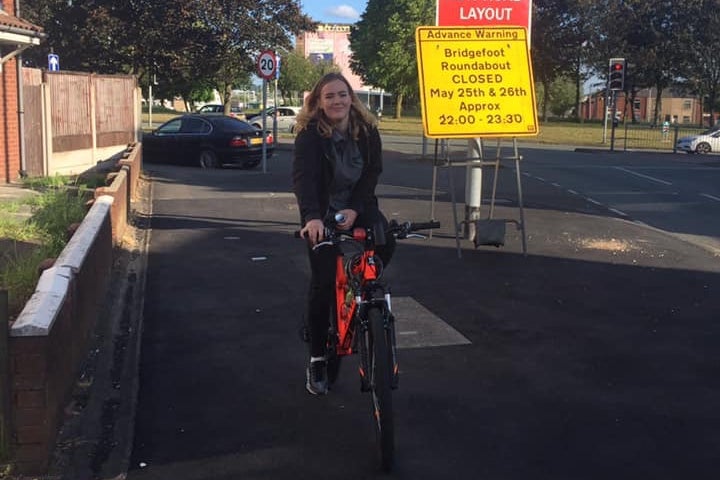As a teenager, Chereece Bateson was going missing so often that even police struggled to keep track.
In one month alone, she disappeared 27 times. She was living in care, “barely eating”, surviving off food banks, and felt safer on the streets than inside the places that were meant to protect her.
Now 24, she looks back on that period as a time when she had “no home, no safety, no control” – and almost no one to turn to.
Today, the young woman from Manchester is helping to build a service she believes could have changed everything for her. She is one of the young advisers behind SafeCall, a new 24-hour lifeline being launched by The Independent and the charity Missing People to support the 70,000 children reported missing each year.
This publication’s goal is to raise £165,000 to help fund SafeCall, so that those children can find support, safety and connection, no matter what. The charity currently reaches one in four of those children – and, with your support, SafeCall will help it to reach many more, offering a lifeline for young people in crisis.
Donate here or text SAFE to 70577 to give £10 to Missing People – enough for one child to get help.
“I wish that support was there when I was in my situation,” Chereece tells The Independent. “I would’ve realised I wasn’t on my own. I’d have had someone who listened, someone who advocated for me. It would’ve given me escape – what I desperately needed.”
Chereece first went missing a few times when she was much younger, but it was when she entered the care system as a teenager that these episodes seriously escalated. She said she once disappeared 27 times in one month as a 15-year-old – then, the following year, she was put in a secure unit to prevent her from going missing.
“I grew up in a toxic household,” she says. “My escape is music and walking. Sometimes being in my own company felt safer than being in the company of those I was with.

“But care exacerbated that, because you don’t know who you’re with. The isolation and control – it causes its own trauma... It was suffocating being where I was, and the environment I was in. I was a child living in a business with no home, family or friends. I had no control over my life.
“My way of gaining that control back was to escape. I felt safer being on the streets than in care homes with strangers, and places I didn’t know anyway.”
Chereece says the measures put in place in an attempt to prevent her from going missing again just left her wanting to disappear even more, and pushed her into riskier situations. But when she was 16, she says, she met a social worker who truly cared, and helped her to get a house of her own the following year.
Living alone, she had very little money at this time, with around £50 a week to live on, and was forced to rely on food banks when she was 17 and 18. But the property was located in an area she wanted to be in, and involved semi-independent living – and Chereece rarely went missing after she moved in.
“She [the social worker] completely changed my life around,” she says now. “My behaviour changed because I had someone working with me.”
Chereece compares the impact this social worker had on her life to that of Missing People.
“The difference it made, one social worker who listened,” she says. “She really stayed behind the scenes, made sure she was patient and actually cared, and wasn’t going to leave. There was equal respect and that level of trust.”
Chereece only came across Missing People after the period when she was in danger of disappearing, and she started working as a young adviser with the charity in March.
“It gives me the ability to implement my experience and hopefully help someone else who might go through that,” she says.
She advised on the development of SafeCall, participating in focus groups and giving her views and opinions, to make sure the service was designed to feel safe and relatable to the young people it aims to support.
“I think it doesn’t just help families and provide that support – it literally can change lives,” she says.

“Talking from the perspective of a young person who experienced those things, I think it would’ve changed my life completely.”
Chereece says working with Missing People has shown her firsthand what a “massive” impact the service has had on young people at risk of disappearing.
“It’s even changed my life working with them, and being able to utilise my negative experience and make it positive, helping me heal,” she explains. “Having my voice heard has been massive. I know, speaking on behalf of other young people, having our voices heard is massive.
“Thankfully, Missing People is there to support people being heard, offering lifelong support for those who’ve unfortunately experienced family and friends or themselves going missing.”
Please donate now to the SafeCall campaign, launched by The Independent and charity Missing People, to help raise £165,000 to create a free service to help find new, safe futures for vulnerable children.
For advice, support and options, if you or someone you love goes missing, text or call Missing People on 116 000. It’s free, confidential and non-judgemental. Or visit missingpeople.org.uk/get-help
Sir David Beckham backs SafeCall campaign to help missing children
How are age progression photos made for missing people?
The truth about young people going missing – and the myths we must stop believing
Horse on the loose closes major motorway
Starmer backs chief of staff after assurances briefing did not come from No 10







